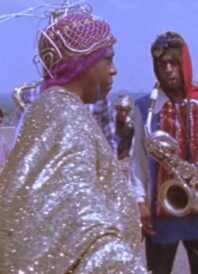
One can describe Robert Mugge’s Sun Ra: A Joyful Noise as deceptively simple, as the camera scans a stage. A lot of this documentary captures its titular jazz great and his band play concerts at clubs, or jam. Even if the film ends up doing only that, it still captures the essence of a band with a philosophy. Viewers see headpieces that the band members wear, signalling that they’re kooky characters we see on urban streets. But together, these men and some women artistically flourish, allowing themselves to create music that takes unpredictable sharp turns. In this context, they’re at a club, most looking at the music they wrote, some checking out the camera. The film, obligatorily, has its interviews, which make the band, especially, its leader Sun Ra, shine the way he should.
The focus here is, obviously, Sun Ra, but the documentary also interviews the other band members like John Gilmore. Those interviews are challenging in a film that mostly exists with the sprawling freedom that is cinema for vibes. A voiceover is asking why Gilmore, “one of the best saxophone players in [America]” is with Sun Ra. Sun Ra: A Joyful Noise then depicts Gilmore praising the titular subject for introducing him to avant garde jazz musicians. Interviews like this aren’t trying to show the cracks within the group and one assumes that they don’t exist. It doesn’t seem like Gilmore is overpraising Sun Ra, he’s just being straightforward towards a leader who knows music. The band genuinely loves each other in a familial way, able to point each other in the right direction.
Later on in this mid length documentary, Sun Ra screeches jazz into his keyboard, a scene after an interview. The prior interview has him discussing the neighbours complaining about the avant-garde music that the band is trying to shape. He’s not trying to say anything big or connect it to a larger picture, it’s just a little grievance. Although it contextualises his other interviews where he talks about lofty ideas within Egyptian history and the cosmic future. This isn’t a reach to say that he believes the ideas about past and future combating an oppressive present. All one can do at this point is to create a form of resistance that will eventually spread out. This is a beautiful portrait of a man and a group that were themselves, their message a universal one.
- Rated: TV-14
- Genre: Documentary, Music
- Directed by: Robert Mugge
- Produced by: Robert Mugge

